(By Khalid Masood)
The Abraham Accords, a landmark initiative in Middle Eastern diplomacy, have redefined regional alliances by fostering normalization between Israel and several Arab states, challenging decades of hostility. Signed in 2020, the Accords have spurred economic, security, and cultural cooperation, but their expansion faces hurdles amid the Israeli-Palestinian conflict, the May 2025 India-Pakistan conflict’s ripple effects, and shifting global priorities. For Pakistan, the Accords intersect with its Kashmir advocacy and strategic ties with China, Türkiye, and Saudi Arabia, raising questions about its potential involvement. This article explores the Accords’ definition and origins, the countries that have accepted them, the stances of Saudi Arabia, Türkiye, Iran, and Pakistan, the conditions for their possible participation, the recent Abraham Alliance billboard in Tel Aviv, and the Middle East’s transformation in 2025, with implications for Pakistan’s South Asian interests.
I. Defining the Abraham Accords: Origins, Facilitation, and Signing
The Abraham Accords are a series of agreements aimed at normalizing diplomatic, economic, and security relations between Israel and Arab states, named after the biblical figure Abraham to symbolize shared Judaic and Islamic heritage. Conceived by the United States under President Donald Trump, the Accords were facilitated by US officials, notably Jared Kushner, Trump’s senior advisor, and Avi Berkowitz, with support from UAE’s Mohammed bin Zayed and Bahrain’s King Hamad. Negotiations took place in Washington, D.C., with preliminary agreements reached in August 2020 for the UAE and September 2020 for Bahrain. The Accords were formally signed on 15 September 2020 at the White House South Lawn, with Trump presiding over the ceremony attended by Israeli Prime Minister Benjamin Netanyahu, UAE Foreign Minister Abdullah bin Zayed, and Bahraini Foreign Minister Abdullatif bin Rashid Al Zayani. Trump’s role was pivotal, leveraging US diplomatic influence to broker the deals, offering incentives like F-35 jet sales to the UAE and Western Sahara recognition for Morocco, positioning the Accords as a cornerstone of his foreign policy legacy.
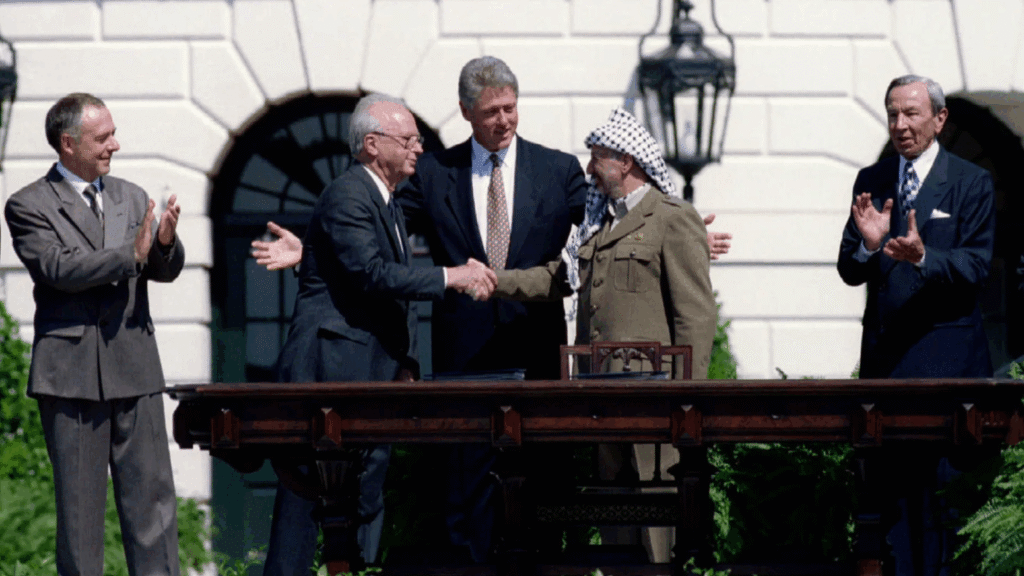
II. Countries That Have Accepted the Abraham Accords
The Abraham Accords consist of a general declaration and bilateral agreements, with the following countries formally engaged:
- United Arab Emirates (UAE): The UAE signed a normalization agreement on 15 September 2020, becoming the first Gulf state to recognize Israel since Jordan in 1994. The agreement spurred trade ($2.5 billion by 2024), direct flights, and joint cybersecurity ventures. By 2025, the UAE mediates Israel-Syria dialogues, leveraging the Accords for regional influence.
- Bahrain: Bahrain joined on 15 September 2020, influenced by Saudi Arabia’s tacit approval due to Manama’s security dependence on Riyadh. The deal fosters intelligence sharing and tourism, though Bahrain’s small size limits its economic impact.
- Morocco: Morocco signed on 10 December 2020, motivated by US recognition of its Western Sahara claim. The agreement includes US arms sales (MQ-9B drones, Patriot systems) and cultural exchanges, with Israeli tourism boosting Morocco’s economy despite Gaza tensions.
- Sudan: Sudan signed the general declaration on 23 October 2020, but political instability has stalled a formal bilateral agreement. The transitional government’s intent to normalize faces domestic opposition, including a law banning Israel ties.
These countries have deepened ties with Israel, with 25% of Israel’s defence exports directed to Accord states by 2025, alongside initiatives like the UAE’s Abrahamic Family House, promoting interfaith dialogue.
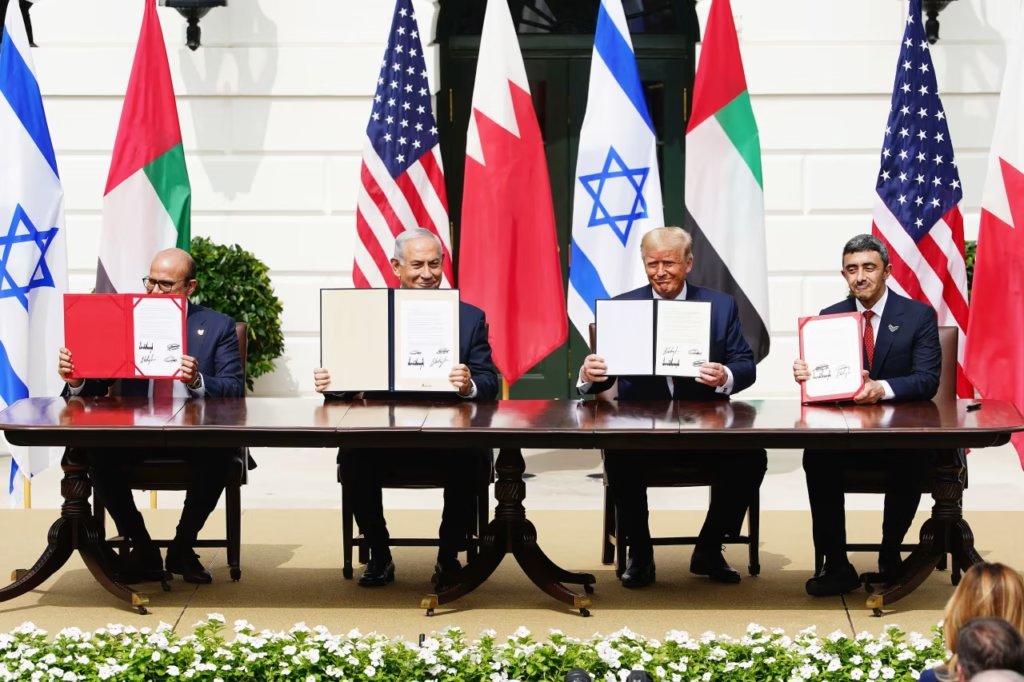
III. Positions of Saudi Arabia, Türkiye, Iran, and Pakistan
Saudi Arabia
Position: Saudi Arabia has not joined the Abraham Accords but engaged in 2025 negotiations under the second Trump administration. Riyadh’s interest stems from countering Iran’s nuclear ambitions, evident in 2010s backchannel talks with Israel. However, Saudi Arabia demands a two-state solution with pre-1967 borders and East Jerusalem as Palestine’s capital, a stance reinforced by the October 2023 Israel-Hamas war. A 2024 Arab-Islamic summit in Riyadh condemned Israel’s Gaza actions, reflecting public sentiment.
Circumstances for Acceptance: Saudi Arabia might join if:
- US offers NATO-like security guarantees, F-35 jets, and civilian nuclear technology, aligning with Saudi Vision 2030.
- A credible Palestinian statehood plan emerges, mitigating domestic backlash from clerics and citizens.
- Israel’s technological expertise enhances Saudi’s NEOM and AI initiatives, outweighing public opposition.
Challenges: Crown Prince Mohammed bin Salman faces resistance due to Gaza’s devastation. Saudi Arabia’s 2023 China-mediated rapprochement with Iran prioritizes de-escalation, reducing urgency for Israel alignment.
Türkiye
Position: Türkiye, a NATO member, suspended trade with Israel in May 2024 over Gaza, rejecting the Accords. President Recep Tayyip Erdoğan champions Palestinian rights, bolstering Türkiye’s regional influence. However, Ankara’s reconciliation with Saudi Arabia and UAE, and its role in Syrian diplomacy post-Assad (December 2024), align indirectly with Accord dynamics.
Circumstances for Acceptance: Türkiye might consider joining if:
- A US-brokered deal includes Türkiye in a Middle East security framework, balancing its rivalry with Iran.
- Economic incentives, like India-Middle East Economic Corridor (IMEC) trade benefits, are offered.
- Israel advances Palestinian rights, aligning with Erdoğan’s domestic narrative.
Challenges: Türkiye’s religious stance against Israel and competition in Syria make normalization unlikely without significant Palestinian progress.
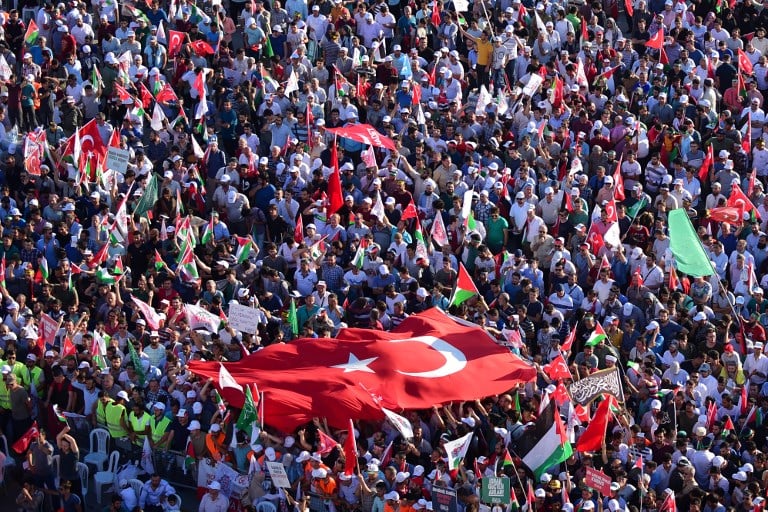
Iran
Position: Iran vehemently opposes the Accords, viewing them as a US-Israeli strategy to isolate Tehran. The Accords’ anti-Iran focus, evident in UAE-Bahrain missile defence cooperation, clashes with Iran’s regional goals. Despite 2023 rapprochement with Saudi Arabia and a June 2025 US-Iran ceasefire after a 12-day war, Iran’s regime rejects normalization. Proposals for a Cyrus Accords post-Islamic Republic remain speculative.
Circumstances for Acceptance: Iran might engage if:
- A regime change introduces a pro-Western government, as suggested by Reza Pahlavi.
- US lifts sanctions and offers nuclear concessions, per Steve Witkoff’s June 2025 proposal.
- Palestinian rights are prioritized, aligning with Iran’s ideology.
Challenges: Iran’s ring of fire strategy via Hamas and Hezbollah, and June 2025 strikes on Fordow and Natanz, entrench opposition.
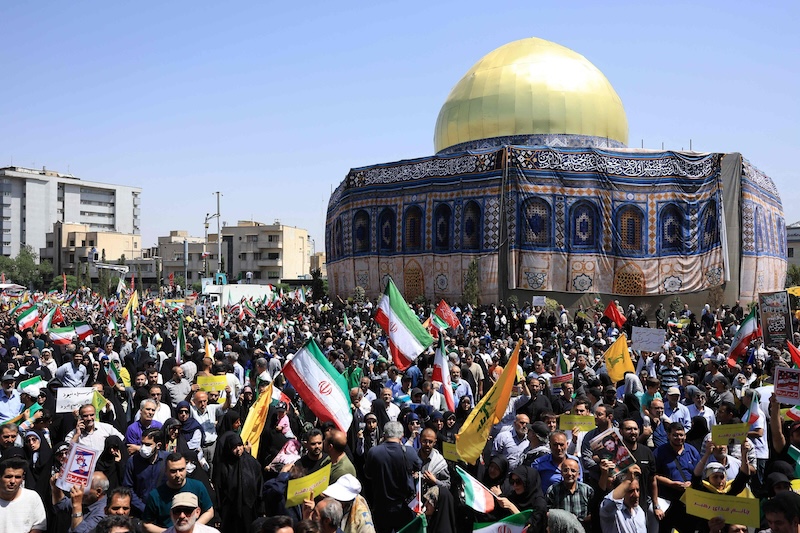
Pakistan
Position: Pakistan does not recognize Israel and rejects the Accords, prioritizing Palestinian statehood with pre-1967 borders and East Jerusalem as the capital. In July 2025, Rana Sanaullah emphasized alignment with Saudi Arabia, Türkiye, Iran, and Malaysia, tying Palestinian rights to Kashmir. The May 2025 India-Pakistan conflict, where Pakistan downed six Indian jets and struck 36 military assets, reinforced its status and OIC advocacy.
Circumstances for Acceptance: Pakistan might join if:
- Saudi Arabia, Türkiye, and Iran normalize, providing diplomatic cover.
- A two-state solution is implemented, aligning with Pakistan’s Kashmir stance.
- US offers military (e.g., F-16 upgrades) or economic aid, though China’s CPEC influence limits appeal.
Challenges: Pakistan’s 96% public support for Kashmir and Palestinian causes, bolstered post-May 2025, and China ties make acceptance unlikely without Palestinian progress.
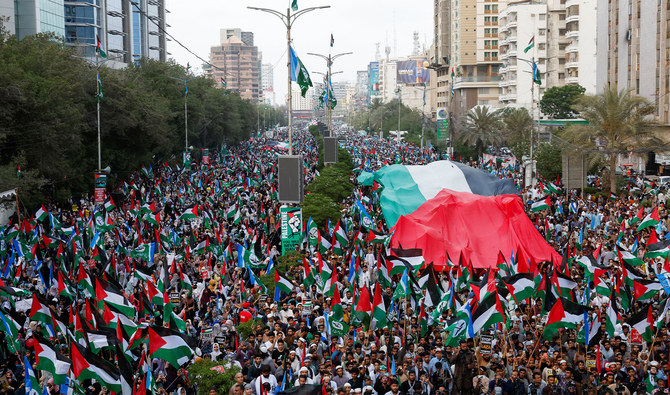
Previous
IV. The Evolving Middle East in 2025
The Middle East in 2025 is transforming, shaped by the Abraham Accords and broader trends:
- Security Cooperation: The Accords enable a US-led missile defence network, with UAE and Bahrain countering Iran’s April 2024 attack. Syria’s post-Assad leader, Ahmed al-Sharaa (also known as Abu Mohammad al-Julani), shows openness to join, but Israeli actions in Syria hinder progress.
- Economic Integration: Trade between Israel and Accord states has grown ($10 billion by 2024), with IMEC linking India, UAE, Saudi Arabia, Jordan, Israel, and Europe, rivaling China’s Belt and Road. Pakistan benefits indirectly via CPEC–UAE trade.
- Palestinian Focus: The Gaza war has re-centralized Palestinian rights, with Egypt’s March 2025 Gaza reconstruction plan pushing for peace. Saudi Arabia and Türkiye’s insistence on a two-state solution slows Accord expansion.
- De-escalation Trends: Saudi-Iran and Türkiye-GCC rapprochements, and Syria’s Arab League return, prioritize stability over Iran-centric alliances.
- Global Shifts: Trump’s push for Saudi and Syrian inclusion faces competition from China’s economic influence and Russia’s Syrian role.

V. Implications for Pakistan and South Asia
The Accords impact Pakistan’s strategic landscape:
- Kashmir Advocacy: Pakistan leverages OIC to link Palestinian and Kashmir issues, gaining traction post-May 2025 conflict, where it successfully defeated Indian aggression and earned respect.
- CPEC vs. IMEC: IMEC’s trade potential could integrate Pakistan via UAE and Saudi partnerships, but CPEC remains its economic backbone.
- Diplomatic Balancing: Pakistan’s alignment with China, Türkiye, and Iran limits Accord participation, though Saudi normalization could shift dynamics.
VI. The Abraham Alliance Billboard: A New Vision for the Middle East
In July 2025, a prominent billboard unveiled in Tel Aviv bore the slogan: “The Abraham Alliance. It’s Time for a New Middle East,” signaling a bold push for expanded normalization with Israel. Framed as a call for regional peace, the billboard prominently featured US President Donald Trump, reflecting his pivotal role in brokering the Accords and his renewed focus on their expansion in his second term. Notably, it included Syria’s de facto leader, Abu Mohammad al-Julani (now Ahmed al-Sharaa), who assumed power post-Assad in December 2024. This inclusion aligns with US Special Envoy Steve Witkoff’s June 2025 comments hinting at “upcoming announcements” regarding additional Muslim-majority nations joining the Accords. Julani’s presence suggests Syria’s potential inclusion, leveraging its Arab League reintegration and UAE-mediated dialogues. However, Israeli military actions in Syria and Palestinian concerns pose challenges, complicating Pakistan’s position as it balances OIC solidarity with Saudi and UAE economic ties.
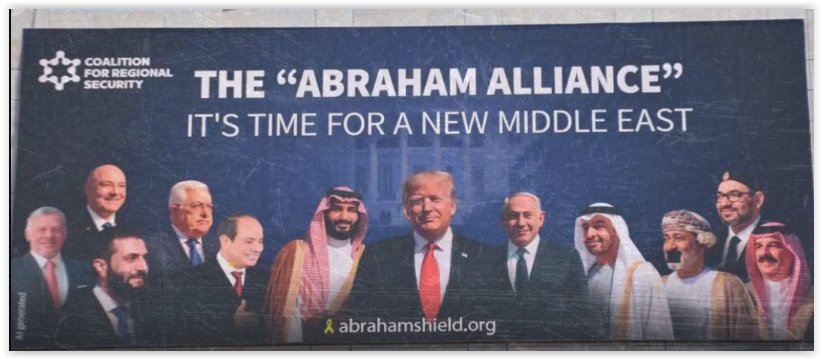
VII. Conclusion
The Abraham Accords, signed on 15 September 2020 at the White House under Trump’s facilitation, have united the UAE, Bahrain, Morocco, and partially Sudan with Israel, fostering trade and security cooperation. Saudi Arabia’s potential accession depends on Palestinian statehood and US incentives, while Türkiye and Iran resist due to Gaza and ideological opposition. Pakistan, aligned with OIC and Kashmir advocacy, is unlikely to join. Tel Aviv billboard, featuring Trump and Julani, underscores the Accords’ ambition to reshape the Middle East in 2025 through broader normalization. Amid economic integration via IMEC and Gaza reconstruction, Pakistan must navigate opportunities and challenges to maintain its pro-Palestinian stance and South Asian influence.

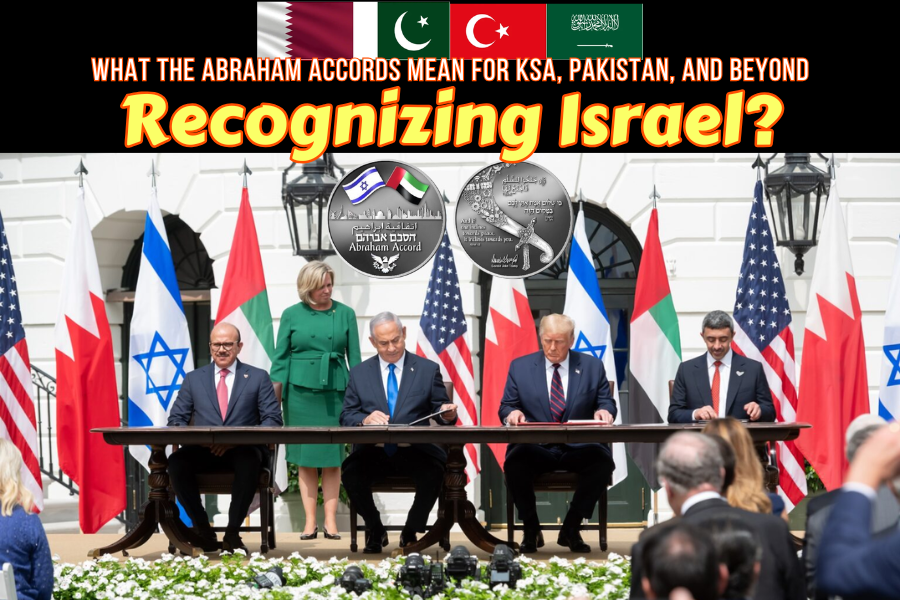
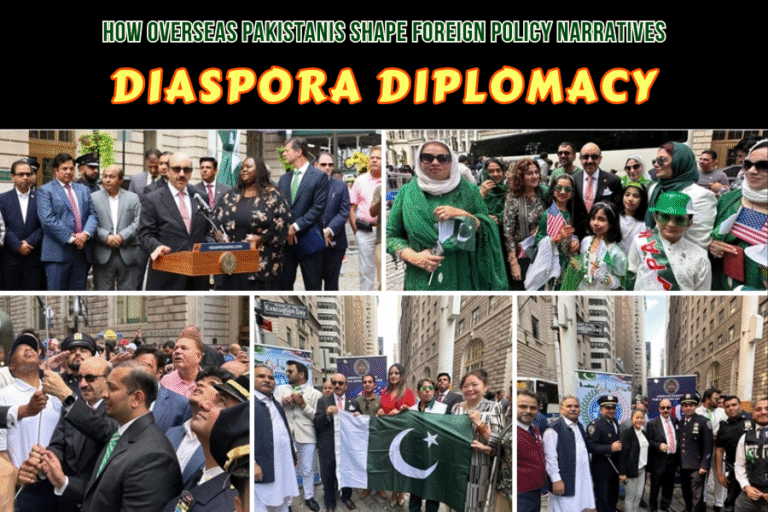
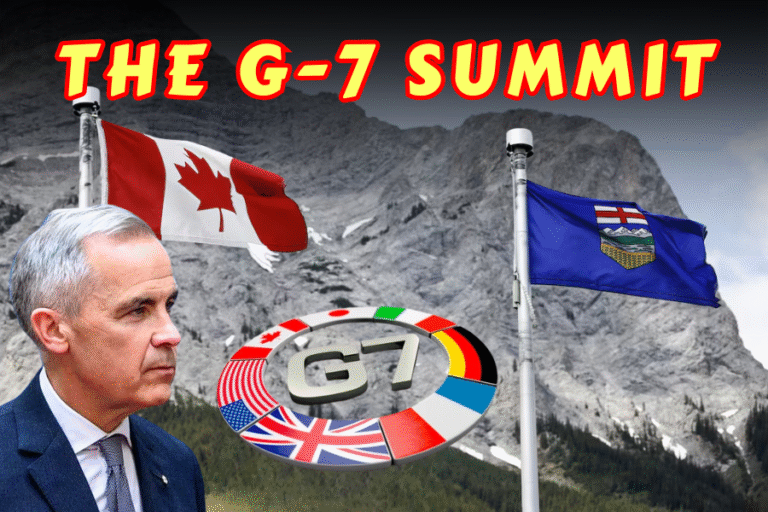
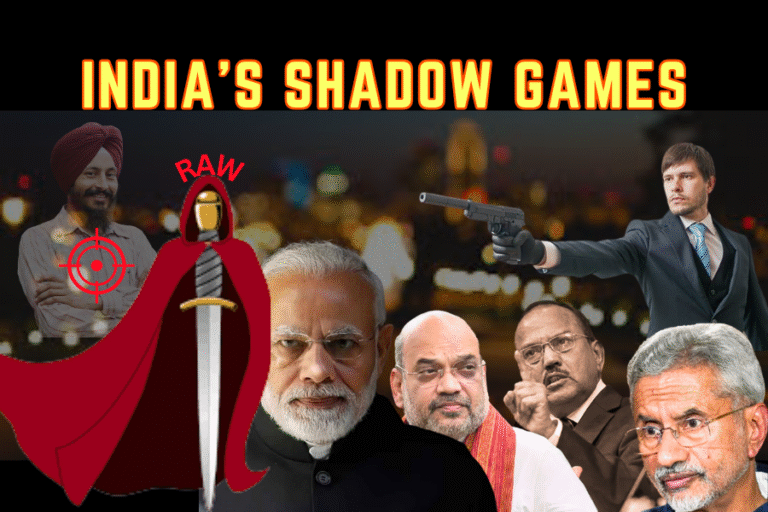
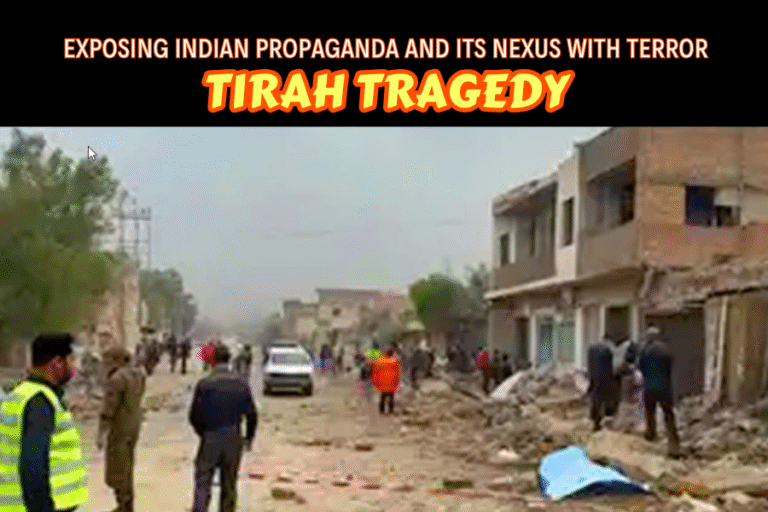
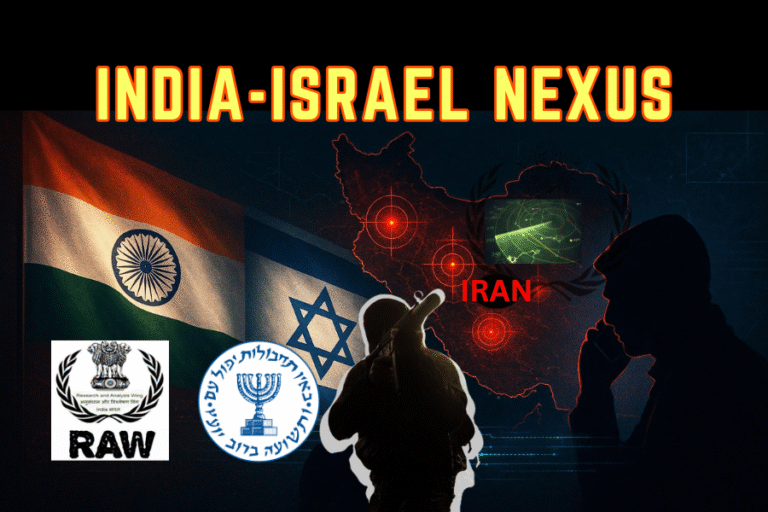

Your circumstances for Pakistan’s acceptance of Abraham Accords:
– Saudi Arabia, Türkiye, and Iran normalize, providing diplomatic cover.
– A two-state solution is implemented, aligning with Pakistan’s Kashmir stance.
– US offers military (e.g., F-16 upgrades) or economic aid, though China’s CPEC influence limits appeal.
Either it is flawed due to lack of understanding or ill intentions for making up readers’ minds. There is no linkage of Pakistan’s acceptance with Saudi Arabia or Turkiye etc. Pakistan has its own positions, not motivate by present political standing but rather the stance taken by Allama Iqbal in 1930s and later by Quaid-e-Azam after creation of Pakistan.
Sorry to say, but your last point sounds more like an opportunist seeking some benefit out of their each and every move. I would never like my country to even think of any petty advantages standing for a principle.
Pakistan must have a single-point agenda: Liberation of Palestine as a totally autonomous country like any other country in the world and its recognition by all the stake-holders including Israel and USA.